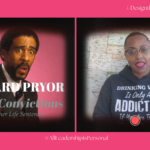Who do you talk to?

Ultimately, it is an act of self-care to know when my kee-kee person can and can’t be my “oh shit” person: who do you talk to?
So, I made a pretty big mistake. Actually, it could be called a mistake and a series of questionable judgment calls. I am very clear about 75% of what I could’ve done differently. I’ve sifted as much from this experience as I think is possible on my own. Now, I want to process it with someone because I want to check for blind spots and possibly hear a perspective that hasn’t occurred to me. But who will I talk to?
Because I don’t believe in spreading my pain and problems broadly (rehashing them feels like feeding them (whatever you feed will grow)), choosing the person with whom I share this is a big deal.
As I think about my talking goals and my own emotional safety needs, I think about what makes a person a credible ear: just because the person is family, older, or maybe has even gone through a similar experience, that doesn’t make them credible. I need someone whose perspective and character I respect, who understands and roots for me, and who asks questions rather than giving advice (UNLESS I ask for advice).
On the other hand, I will choose a person who handles me in a “delicate, but straight-shooter” manner because I don’t receive information, even if it’s good information, from keeping-it-real types who can’t square candor and thoughtfulness.
I don’t take for granted that the person has the mental and emotional bandwidth, time, and willingness to talk. Therefore, I will ask the person whether they are willing to help me sort out my situation rather than blindly dumping on them. Not only does asking respect the listener, it also communicates to them how important the conversation is and reduces the possibility that I’ll have to pack it up and take it to another person
Finally, when I talk with someone about what’s really going on in my life, I get clear about whether I’m releasing an emotion, sharing a problem because I’m over it, or processing to develop a narrative or perspective that enables me to use the experience. This matters because it helps me manage feeling embarrassment, but not feeling ashamed of myself. The former is about what I did. The latter is about my abilities and who I am.
When I decide to talk, it’s pretty big deal, and I need to know what I’m hoping to gain from talking in the first place. Not only does this clarity inform who I talk to so that I don’t feel disappointed in people for not giving me what I need, it is empowering and a reminder that I always have choices.
How do you honor and respect yourself and the people in your life when you are sorting out your stuff?
In one of my recent episodes on The Leadership Drives Podcast, I spoke with Pam Chatman, founder of Boss Lady Economic Planning and Workforce Transportation. Listen for the part of the conversation where we talking figuring out who you can talk to!





